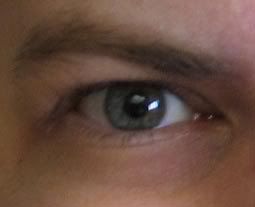Never Diet Again
If you don't know Rob Grant, he's the co-creator of a certain SF comedy series, and the author of Colony (not-bad, not-awesome SF comic novel) and Incompetence (very decent SF comic novel).
If you DO know Rob Grant - think again. You really, really don't.
The novel is Fat. It's out just after Christmas. And it's incredible.
Three parallel stories are told - heavily overweight Grenville Roberts struggles to control his temper and risks his career, teenager Hayleigh is avoiding food wherever possible, and PR man Jeremy is in charge of marketing the government's new fat camp scheme.
The brisk, gentle storyline isn't the real meat of the piece, though. Each one gives Grant a chance to provide perspective on what has become a national obsession.
And what perspective it is. Fat is almost allergic to quick-definition labels. No fat, no thin, no tall, no short. Our teenager's precise age is left vague, and we NEVER see the word 'anorexia'. Grenville's job is unremarked-upon until it's needed. And Jeremy...well, when he calls himself a conceptuologist you know Grant's having some fun. (And maybe it's just me, but I took it as a tiny dig at Dan 'he's a symbologist' Brown.)
No labels. People are who they are and what they think far more than what they DO. Yet the book is fascinated by action and reaction, by what its people ARE doing.
There are many, many razor-sharp sequences as Hayleigh struggles to hide from every mirror in the house, to make and pretend to eat an entire cooked breakfast. (This continues throughout the story, and climaxes in a hospital bathroom with a heartbreakingly matter-of-fact descent in desperation.) Being inside the girl's head so credibly makes these escalations of events painfully compelling...and the relief when Gren throws an equally-escalating fit of pique acts as a counterpoint, a vent for tension.
And it is this this way that Grant not only improves on his previous books, he blows them off the map with a tactical nuke.
Where logical escalation became, in the end, a frustration in Colony (the main character, a head in a jar, was incorrectly hooked up to his new body - arms move when he wants to walk. Funny for two chapters, irritating after twelve) and Incompetence (a society of people who can't do their job is frequently hilarious; but character frustration shouldn't always lead to reader frustration), here Grant finds a way to frame that frustration so the reader is aware of it, rather than suffering with it.
The three strands of Fat balance the whole tricky business. Grenville's story is visceral, physical. It makes you aware of the body - the LARGE body - and it's functions and actions. Hayleigh's is emotional, irrational. (Yet played clinical and rational - her need to avoid food, to fake not only meals but also her long-lost periods, seems so horribly SENSIBLE.) She lives in her head. But the intellectual side, the sense and the facts, come from Jeremy's side...or, rather, the side of the remarkable woman he runs into.
Coupled with a 'what next?' chapter style - where you have to read on, but never in a cheap cliffhanger-y way - it's a remarkable cycle. You get a belly laugh, a heart flutter, then some food for thought. And round and round it goes, like some perfectly-timed waltz with rarely a step put wrong.
The clarity of formatting includes the book's three sections - a single day for parts one and three, a specific period for part two, all preceded with a menu of what will be eaten in the coming chapters.
There's the occasional, very rare, over-egging of the pudding. (Food metaphors impossible to avoid, I'm afraid.) Chapters taken from fictional recipe and anger-management books are a spoof to far, but it's hard to get too picky with such well-handled material. Grant has done his research (even if he can't remember that it was Ben Stiller, not Owen Wilson, who had the "Do it" catchphrase in Starsky and Hutch).
Like Ben Elton with subtlety, or Michael Crichton with a conscience, Fat is filled with facts. Unlike those writers, you rarely feel bludgeoned by them. In fact, by having the terrifying - for all the right reasons - information tumble from the mouth of a woman who just can't shut up, Grant finds an excuse to rant. That her audience of one is a guy more interested in getting her naked strips away the pretension. How can it be 'just' the author's manifesto when the only other character in the room is waiting for her to shut up?
Deeply cynical about the accepted facts, Fat is going to change the way you look at diet culture, about so much that you THINK you know. Salt is bad for you, fatty foods are destructive. Sure about that?
I'm not. Not any more.
Still, Fat isn't a lecture. It's three running anecdotes with a wonderful line in laugh-out-loud humour, plus some classy emotional weight that, hitherto, one might not have expected of the author.
If there's any justice, this is going to be THE novel of 2007. Fat should be on everybody's lips (*sigh*). Buy it for yourself. Buy it for friends. It's a wake-up call for the Weight Watchers generation.


2 Comments:
Great review as always! I've really enjoyed reading your blog this year and hope to see more in 2007. Hope you and your sexy eye had a fab Xmas, too.
xx
You too, CB. Thanks for a great year of cynicism! :-x
Post a Comment
<< Home